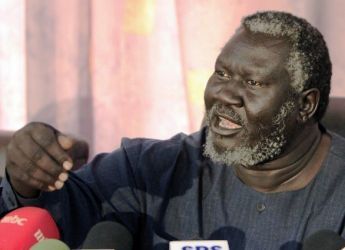SPLM-N rebels stick to comprehensive conflict resolution in Sudan
July 8, 2012 (NAIROBI) – Sudanese rebel leader, Malik Agar, reaffirmed the commitment of his group to a comprehensive process to settle all the conflicts in the country, rejecting any direct talks on the South Kordofan-Blue Nile conflict.

Sudan and South Sudan endorsed a Comprehensive Strategic Approach to resolve the outstanding issues and other conflicts including the support of rebel groups on the both sides of common border.
The strategic approach also provides for direct talks between the SPLM-N and Sudanese government when the parties resume talks on 12 July. It also states that Khartoum accepts the buffer zone based on the map proposed by the mediation team.
“We strongly support diplomatic efforts being exerted by the African Union and the international community. These all are good initiatives because they are geared toward finding peaceful settlement to the Sudanese conflict,” said Agar commending the efforts of the AU mediation and United Nations Security Council (UNSC) to bring peace in Sudan.
“But these efforts should be comprehensive,” Malik Agar stressed.
The rebel leader disclosed that they recently wrote to AU mediators, the African Union Peace and Security Council and to members of the international community, informing them of the SPLM-N’s position on the proposed talks with Khartoum.
“We told them clearly that Sudanese people need your support to bring total peace and stability. This support should not be limited to certain areas or regions. It must be inclusive to address all conflict,” Agar pointed out.
The SPLM-N blames Khartoum for not allowing humanitarian access to the civilians in the rebel held areas in South Kordofan and Blue Nile despite the government’s announced acceptance of a tripartite initiative put forward by the African Union, Arab League and United Nations.
Khartoum wants this initiative be signed with the UN, AU and Arab League and to exclude the SPLM-N from the humanitarian agreement.
SPLM-N rebels had previously signed, on 28 June 2011, a framework agreement to end South Kordofan’s conflict but President Omar Bashir denounced the deal saying the SPLM-N should be disarmed before a government delegation can negotiate with them on the basis of the Comprehensive Peace Agreement (CPA).
The chief mediator Thabo Mbeki met President Bashir on Saturday to discuss ways to make a breakthrough in the talks before the 2 August, a deadline determined by the AU roadmap and UNSC resolution 2046.
South Sudan minister of information and cabinet spokesperson, Barnaba Marial Benjamin, hailed the recent progress achieved in the talks with the Sudanese government on the outstanding issues. He, however, distanced his country from any other development related to negotiations between Sudan and SPLM-N rebels.
“We have said many times that we are a country that does not involve itself in the affairs of another country. This is something written in the constitution, the supreme law of any country. It is not what we say for the sake of it,” the minister said to Sudan Tribune on Sunday.
South Sudan wants to live in peace with Sudan, Marial emphasised.
“We are both encouraged that we’ve been able to put the recent difficulties behind us so that we can focus on the many challenges still ahead of us, and we want to use the positive momentum generated by our recent agreement to take tangible, visible steps on our many shared core interests” he said.
The international community believes that no viable settlement of the Sudan-South Sudan ‘crisis’ can be achieved without the resolution of the SPLM-N conflict with Khartoum.
Also, the regional and international efforts to involve the SPLM-N in the process brokered by the AU mediation implies the end of SRF alliance as Darfur rebel groups are not concerned by this demarche.
On the other hand, it is not yet clear on which basis the talks between Khartoum and SPLM-N rebels will be held. Sudan still maintains its rejection of the 28 June agreement and asks to link the process with the 2005 CPA and particularly the protocol related to the South Kordofan and Blue Nile.
(ST)
